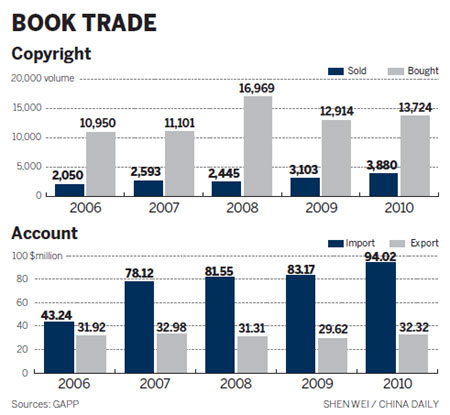Book market tries to turn a new page
Updated: 2012-02-17 08:37
By Zhang Yuchen (China Daily)
|
|||||||||
One major hurdle, added Boos, is the lack of highly trained translators and foreign-language editors in China.
Translators for books about Chinese business, law and literature are usually native speakers with a good background in education and linguistics, such as American sinologist Howald Goldblatt, who worked on best-seller Wolf Totem, and Cambridge professor Julia Lovell.
"There is never a simply literary equivalent in a different language," said Lusby, whose company released Wolf Totem in 2008. She explained that to translate a Chinese book for the English-speaking market takes an "amazing understanding" of both languages and cultures.
The shortage of talent is an issue the GAPP has been trying to address for a while. Since 2008, the authority has been working with Penguin China to run translation-training programs, coaching 20 students each time - half of them Chinese, the other half native English speakers.
However, supply is still far short of demand, not least because the low wages usually offered for translating literature mean many talents shun the work for better paying jobs.
Contemporary works
Joshua Dyer, who studied Mandarin in Taiwan in 2002, has been translating video games and other entertainment products in Beijing for the last three years. He complained that there are not even translated works about popular Chinese culture.
"I want to read a book (in English) that can give me a specific insight, either into the culture or other things. I find I can't read any that offer real firsthand accounts," said the US native, who added that the four or five translated works he had read recently were by English-speaking authors.

Hot Topics
Wu Ying, iPad, Jeremy Lin, Valentine's Day, Real Name, Whitney Houston, Syria,Iranian issue, Sanyan tourism, Giving birth in Hong Kong, Cadmium spill, housing policy
Editor's Picks

|

|

|

|

|

|







